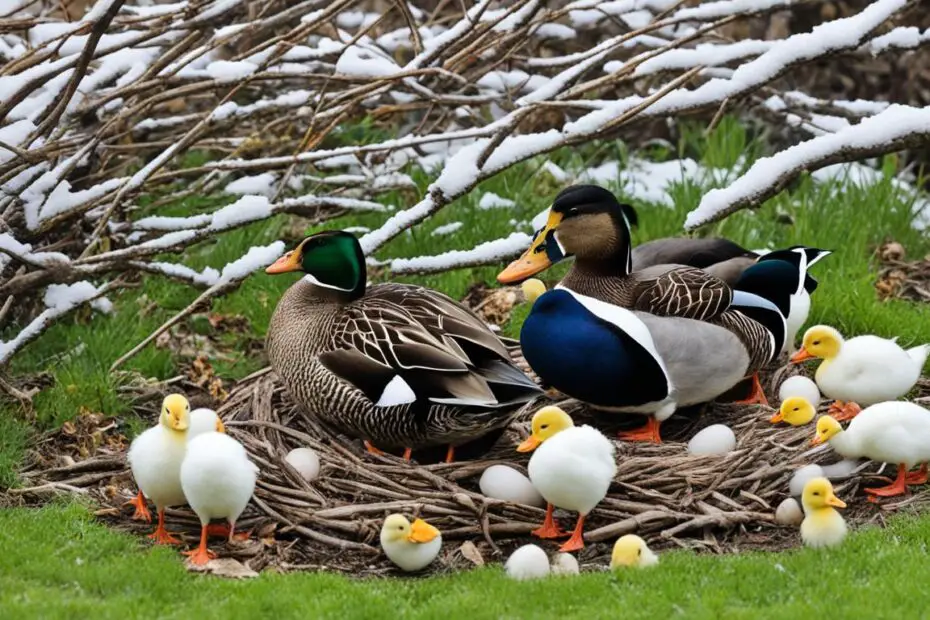If you’ve ever wondered whether ducks lay eggs all year round, you’re not alone. Understanding the egg-laying habits of ducks can help you better care for these fascinating creatures. Let’s explore the duck egg production process and discover the factors that affect their egg-laying patterns.
Key Takeaways:
- Ducks do not lay eggs year-round, and their egg-laying capabilities decline and eventually stop as they age.
- The exact time when ducks stop laying eggs can vary depending on factors such as breed, health level, and environmental conditions.
- Factors such as age, breed, daylight, and stress levels can affect duck egg production.
- Ducks have a seasonal egg-laying pattern, with the breeding season typically starting in the spring.
- Proper care, nutrition, and a stress-free environment can encourage ducks to lay more eggs.
Factors That Affect Duck Egg Production
Various factors can have an impact on the egg production of ducks. Understanding these factors is crucial for optimizing egg-laying capabilities and ensuring a healthy and productive flock. Here are the key factors that influence duck egg production:
- Age: Ducks typically start laying eggs when they reach maturity, which is usually between 4 to 6 months old. However, the exact age can vary depending on the breed.
- Breed: Different duck breeds have different laying patterns. Smaller breeds tend to start laying eggs earlier than larger breeds.
- Daylight: Ducks require a minimum of 13 to 17 hours of sunlight per day to stimulate egg production. The length of daylight can influence the frequency of egg laying.
- Seasons: The changing seasons can affect egg production. Ducks tend to lay more eggs during the summer and spring when there are longer daylight hours.
- Weather Conditions: Extreme weather, such as extreme heat or cold, can impact egg production. Ducks may lay fewer eggs or even temporarily stop laying during harsh weather conditions.
- Health and Stress: The health and stress levels of ducks can directly affect their ability to lay eggs. Ducks exposed to stress or suffering from health issues may experience a decline in egg-laying capabilities.
Providing ducks with proper nutrition, a stress-free environment, and sufficient daylight can help maintain good egg production. Ensuring their well-being and addressing any health issues promptly are important for optimizing egg-laying behavior. Let’s take a closer look at each of these factors and how they influence duck breeding habits and reproductive cycles.
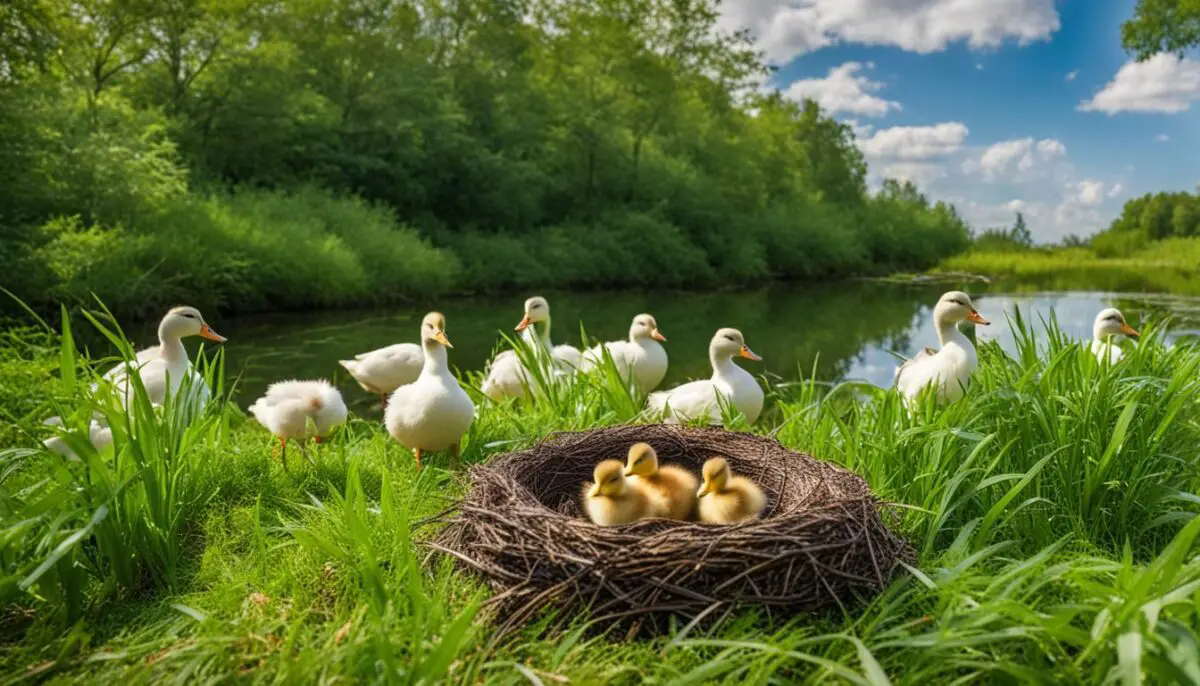
Understanding Duck Egg Production Patterns
Ducks have fascinating egg-laying patterns that follow the changing seasons. While they don’t lay eggs year-round, their reproductive cycles are influenced by various factors such as breed, age, and environmental conditions. Let’s explore the different aspects of duck egg production throughout the year and gain insights into when ducks lay eggs and if they lay eggs in the winter.
Duck Egg-Laying Season and Frequency
The breeding season for ducks typically begins in the spring, coinciding with the wild ducks depositing their eggs. Domestic ducks, including mallards, also tend to start laying eggs in the spring, regardless of their age. Once ducks reach maturity, usually between 4 and 7 months or 16 and 28 weeks, they start laying eggs.
The frequency of egg production varies among duck species. Some ducks may lay one egg every two days, while others can lay up to one egg per day. In some cases, ducks may even lay two eggs in a single day, particularly during their first year when hormonal changes can cause increased egg production.
The Influence of Breed and Winter Conditions
The specific breed of ducks can affect their egg-laying habits. While smaller breeds like Khaki Campbells and Indian Runners are known for their prolific egg production throughout the year, larger breeds such as Muscovies may start laying eggs later, around six months of age.
“Ducks may experience a temporary decline or even temporary cessation of egg production in the winter due to fewer daylight hours. However, this may vary depending on the region and the specific breed of duck.”

During the winter, ducks may experience a decrease in egg production due to shorter daylight hours. While this is a common occurrence, the impact can vary depending on the region and the specific breed of duck. Ducks may temporarily cease or significantly reduce their egg-laying during winter, only to resume their normal egg production when daylight hours increase again.
Summary
Understanding the egg-laying patterns of ducks helps us appreciate their natural instincts and adaptability to changing seasons. Ducks lay eggs mostly during the spring and into the summer, with their productivity influenced by factors such as breed, age, and daylight exposure. While ducks may experience a decline in egg production during the winter, it is a temporary phase, and their egg-laying abilities pick up when favorable conditions return.
| Breed | Egg-Laying Frequency |
|---|---|
| Khaki Campbell | Approximately one egg per day |
| Indian Runner | Approximately one egg per day |
| Muscovy | Varies, generally fewer eggs than other breeds |
As seen in the table above, the Khaki Campbell and Indian Runner breeds are highly productive when it comes to egg-laying, while Muscovy ducks typically lay fewer eggs. However, each breed has its unique characteristics and benefits, so it’s essential to choose the breed that aligns with your specific egg production goals.
Reasons Ducks Stop Laying Eggs
Ducks may stop laying eggs for various reasons. As ducks age, their egg-laying capabilities naturally decline and eventually cease altogether. The breed of the duck can also affect egg production, with some breeds laying fewer eggs than others. Factors such as age, breed, and health can influence when ducks stop laying eggs. Environmental factors such as day length, weather conditions, and stress levels can also impact egg production. Ducks may stop laying if they experience stress, such as being bullied by other ducks or if they do not have access to sufficient water and a clean laying area. Additionally, ducks may temporarily stop laying eggs if they are molting or going through a brooding period. Diseases and infections can also affect egg production. Adequate nutrition, a stress-free environment, and proper healthcare are essential for maintaining good egg production in ducks.
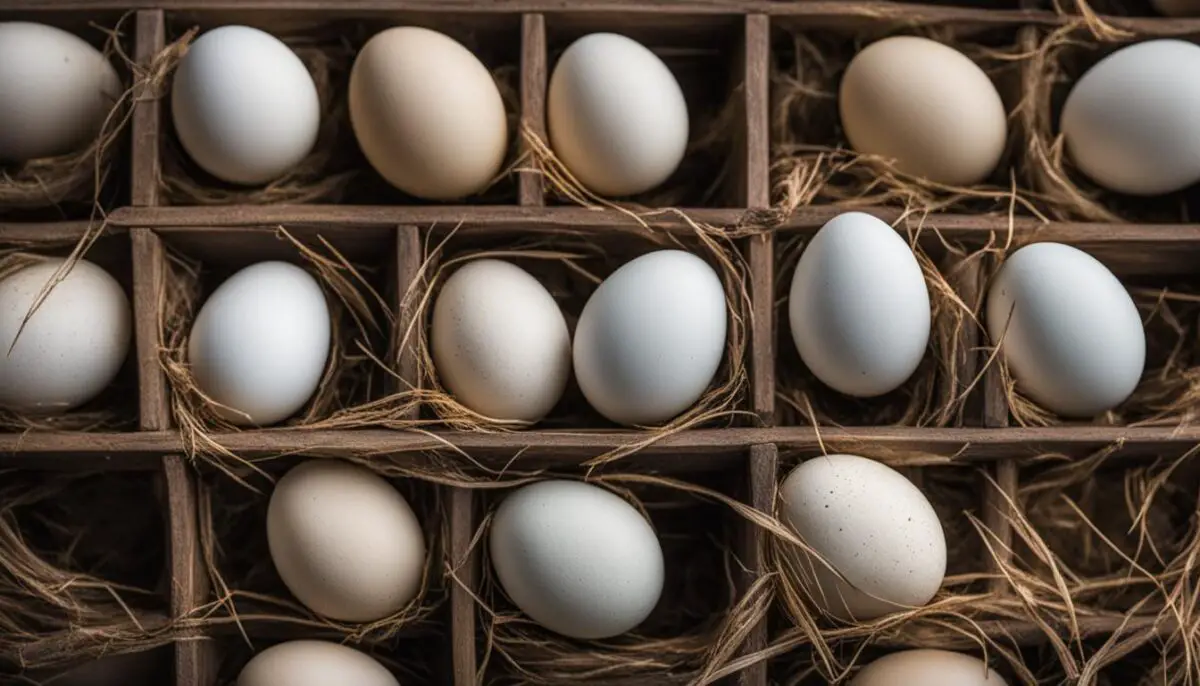
| Reasons Ducks Stop Laying Eggs | Description |
|---|---|
| Age | Ducks naturally stop laying eggs as they age, typically around 7 to 9 years old. |
| Breed | Some duck breeds lay fewer eggs than others, affecting overall egg production. |
| Health | A duck’s health can influence egg production, with poor health leading to a decline in laying. |
| Environmental Factors | Day length, weather conditions, and stress levels can impact a duck’s ability to lay eggs. |
| Stress | Ducks may stop laying eggs if they experience stress, such as bullying or inadequate living conditions. |
| Molting and Brooding | Ducks may temporarily stop laying eggs during molting or when going through a brooding period. |
| Diseases and Infections | Illnesses can negatively affect a duck’s egg-laying capabilities. |
| Proper Care | Adequate nutrition, a stress-free environment, and healthcare are essential for maintaining good egg production in ducks. |
Encouraging Ducks to Lay Eggs Again
While you cannot force ducks to lay eggs, there are steps you can take to encourage egg production. Understanding the specific needs and preferences of your ducks is important. Providing them with proper nutrition, including a high-calcium diet, can help support good egg production. Ducks also require adequate sunlight, so ensuring they have access to at least 14 to 17 hours of daylight can help encourage egg laying. Creating a clean and spacious laying area, protecting ducks from stressors such as predators and aggressive drakes, and providing ample fresh water are important for maintaining good egg production. It’s also important to monitor and address any health issues promptly to prevent or treat diseases and infections that can affect egg production.
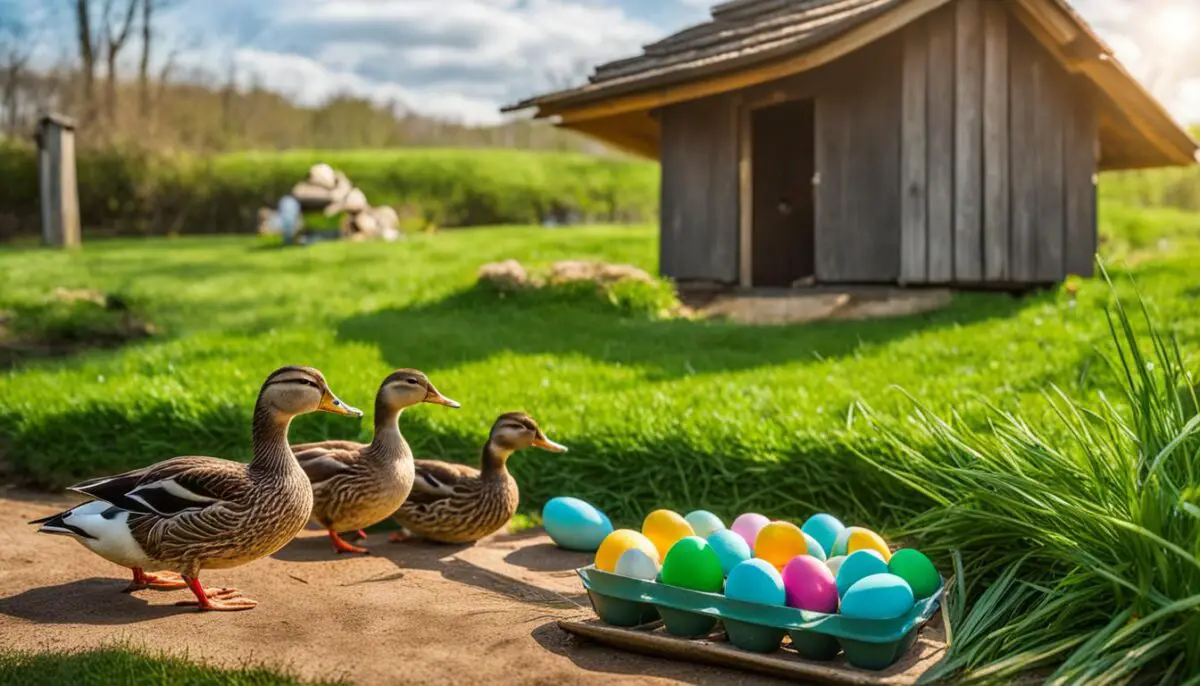
Encouraging ducks to lay eggs again involves understanding their needs and providing them with the right environment and care. Here are some helpful tips:
- Proper Nutrition: Ensure that your ducks receive a well-balanced diet that includes a high-calcium feed. Calcium is vital for eggshell production, so providing an appropriate feed can support good egg laying.
- Adequate Daylight: Ducks require a certain amount of daylight to stimulate egg production. Make sure your ducks have access to 14 to 17 hours of daylight each day. If necessary, you can use artificial lighting to supplement natural daylight.
- Clean and Spacious Laying Area: Create a comfortable and hygienic space where your ducks can lay their eggs. Ensure that the nesting boxes are clean and well-maintained. Provide enough nesting spots and bedding material for your ducks to feel secure while laying their eggs.
- Predator Protection: Protecting your ducks from predators is crucial to maintaining their stress levels. Install fencing or netting to keep out predators like raccoons, foxes, or stray dogs. Regularly inspect your duck enclosure for any vulnerabilities and reinforce accordingly.
- Ample Fresh Water: Ducks need access to clean and fresh water at all times. Ensure that water sources are readily available and easily accessible. Ducks need water to stay hydrated and maintain optimal egg production.
- Monitor and Address Health Issues: Regularly observe your ducks for any signs of illness or injury. Promptly address any health issues and seek veterinary care when necessary. Diseases and infections can impact egg production, so maintaining good health is essential.
By following these tips, you can create an environment that encourages your ducks to lay eggs consistently. Remember to prioritize their well-being and provide the necessary support for optimal egg production.
Common Issues with Duck Egg Production
Ensuring consistent and optimal egg production in ducks can sometimes be challenging. Various factors can contribute to lower egg production or even a complete halt in egg-laying. Understanding these common issues is crucial for overcoming them and improving duck egg production.
Inadequate Daylight and Extreme Weather Conditions
Ducks rely on daylight to stimulate egg production. Insufficient exposure to natural light, especially during the winter months when daylight hours are shorter, can disrupt their reproductive cycle and decrease egg-laying. Similarly, extreme weather conditions such as excessive heat or cold can negatively impact egg production in ducks.
Stress and Environmental Changes
Just like humans, ducks are susceptible to stress, which can significantly affect their egg-laying capabilities. Factors such as predator threats, changes in their environment, or disturbances in their routine can induce stress and lead to decreased egg production. Providing ducks with a calm and secure environment is essential for optimal egg-laying.
Nutritional Deficiencies
A well-balanced diet is crucial for promoting healthy egg production in ducks. Nutritional deficiencies, particularly in terms of protein and calcium, can lead to poor egg quality and reduced production. Ensuring that ducks have access to proper nutrition, including feeds specifically formulated for egg-laying ducks, is essential.
Diseases and Infections
Illnesses and infections can have a significant impact on egg production in ducks. Common ailments such as respiratory infections, parasites, or reproductive disorders can disrupt their reproductive cycle and reduce egg-laying. Regular health check-ups, proper vaccination, and prompt treatment of any diseases or infections are vital for maintaining optimal egg production.
Unfavorable Egg-Laying Behavior
Occasionally, ducks may exhibit unfavorable egg-laying behavior that can hamper egg production. Some ducks may develop the habit of eating their own eggs, which not only reduces egg availability but can also lead to a perpetuation of this destructive behavior. Ducks may also hide their eggs in concealed locations, making egg collection difficult and resulting in lower production. Addressing these behaviors through appropriate training and nest management techniques is important for improving egg production.
In conclusion, several factors can contribute to issues with duck egg production. Inadequate daylight, extreme weather conditions, stress, nutritional deficiencies, diseases and infections, and unfavorable egg-laying behavior are common challenges that can hamper egg production in ducks. Understanding and addressing these issues through proper care, nutrition, and a conducive environment can help improve duck egg production and ensure a steady supply of healthy eggs.
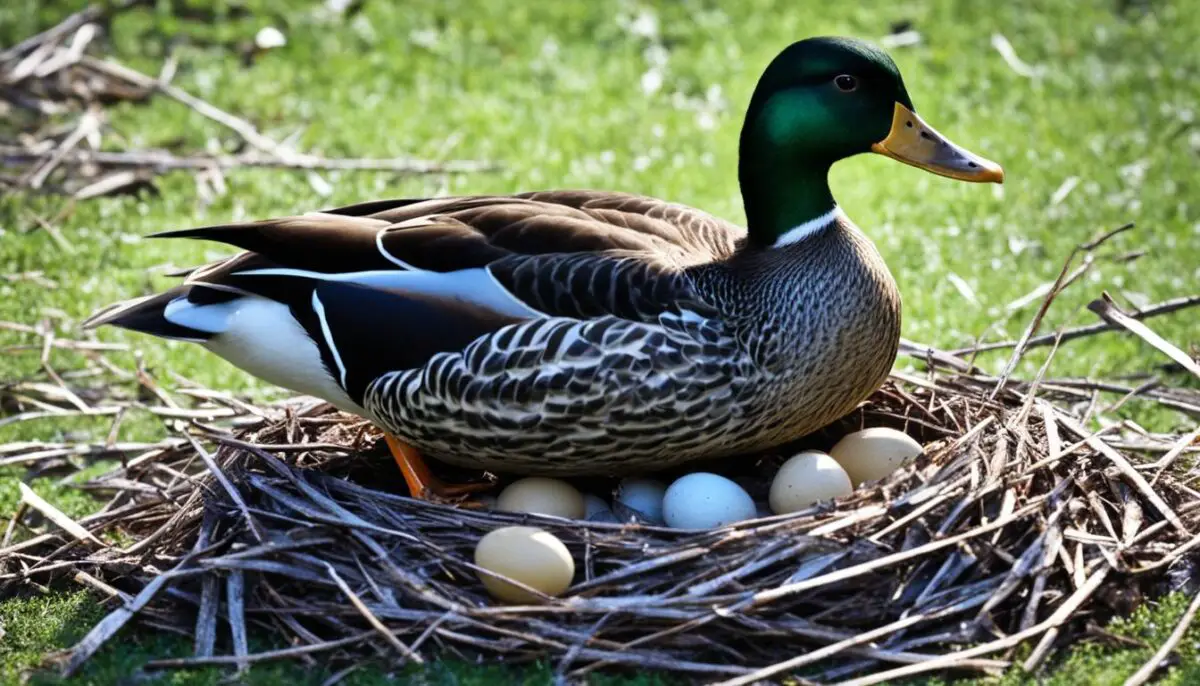
Choosing the Right Duck Breed for Egg Production
If your main goal is to have good egg production from your ducks, choosing the right breed is important. Some duck breeds are known for their prolific egg-laying capabilities, such as Khaki Campbells and Indian Runners. These breeds can lay a high number of eggs throughout the year and may even lay eggs consistently. Other breeds, such as Welsh Harlequins, Magpies, and Khaki Campbells, are also known for their good egg production.
If these breeds are not available in your area, there are other breeds that can still provide decent egg production. It’s important to research and select a breed that suits your specific needs and environment when it comes to egg production.
Below is a table comparing some of the best duck breeds for egg production:
| Breed | Egg Production | Size | Temperament |
|---|---|---|---|
| Khaki Campbell | Excellent | Medium | Friendly |
| Indian Runner | Good | Medium | Active |
| Welsh Harlequin | Good | Medium | Gentle |
| Magpie | Good | Medium | Active |
Remember, the breed is not the only factor that determines egg production. Other factors such as nutrition, environment, and overall duck health also play a crucial role. Take your time to evaluate different breed options and consider consulting with experienced duck breeders or poultry experts to make an informed decision.
Conclusion
After considering various factors, it is clear that ducks do not lay eggs continuously or all year round. Their egg-laying capabilities gradually decline and eventually stop, typically around 7 to 9 years of age. Breed, age, health, environmental conditions, and nutrition all play important roles in duck egg production.
To optimize egg production, it is crucial to understand these factors and provide the appropriate care and conditions. While it is not possible to force ducks to lay eggs, there are steps that can be taken to encourage good egg production. Creating a stress-free environment, ensuring adequate sunlight exposure, providing a clean and spacious laying area, and promptly addressing any health issues are all key factors in promoting optimal egg production.
Additionally, choosing the right duck breed for egg production can significantly impact egg laying. Some breeds, such as Khaki Campbells and Indian Runners, are known for their prolific egg-laying capabilities. And while not all ducks will lay eggs throughout the entire year, careful breed selection can help maximize the number of eggs laid.
In conclusion, understanding the natural egg-laying patterns of ducks, providing proper care and conditions, and selecting the right breed can all contribute to increased egg production. With the right approach, you can enjoy a steady supply of delicious duck eggs while ensuring the well-being of your feathered friends.
FAQ
Do ducks lay eggs all year round?
No, ducks do not lay eggs year-round. Their egg-laying capabilities decline and eventually stop, usually when they reach 7 to 9 years old.
What factors affect duck egg production?
Factors such as breed, age, health, environmental conditions, and nutrition can affect the egg production of ducks.
When do ducks lay eggs?
Ducks start laying eggs when they reach maturity, typically around 4 to 6 months old. However, the exact timing can vary depending on the breed and environmental factors.
Why do ducks stop laying eggs?
Ducks may stop laying eggs due to factors such as age, breed, health, stress, environmental conditions, molting, brooding, or diseases and infections.
How can I encourage ducks to lay eggs again?
Providing a stress-free environment, adequate sunlight exposure, a clean and spacious laying area, proper nutrition, and prompt healthcare can help encourage ducks to lay eggs.
What are the common issues with duck egg production?
Common issues with duck egg production include inadequate daylight, extreme weather conditions, stress, nutritional deficiencies, diseases and infections, egg-eating behavior, and hiding eggs.
Which duck breed is best for egg production?
Some duck breeds known for their good egg production include Khaki Campbells, Indian Runners, Welsh Harlequins, and Magpies. It’s important to research and choose a breed that suits your specific needs and environment.
Do ducks lay eggs all year round? Conclusion
Ducks do not lay eggs continuously or all year round. Their egg-laying capabilities gradually decline and eventually stop, usually around 7 to 9 years of age.
